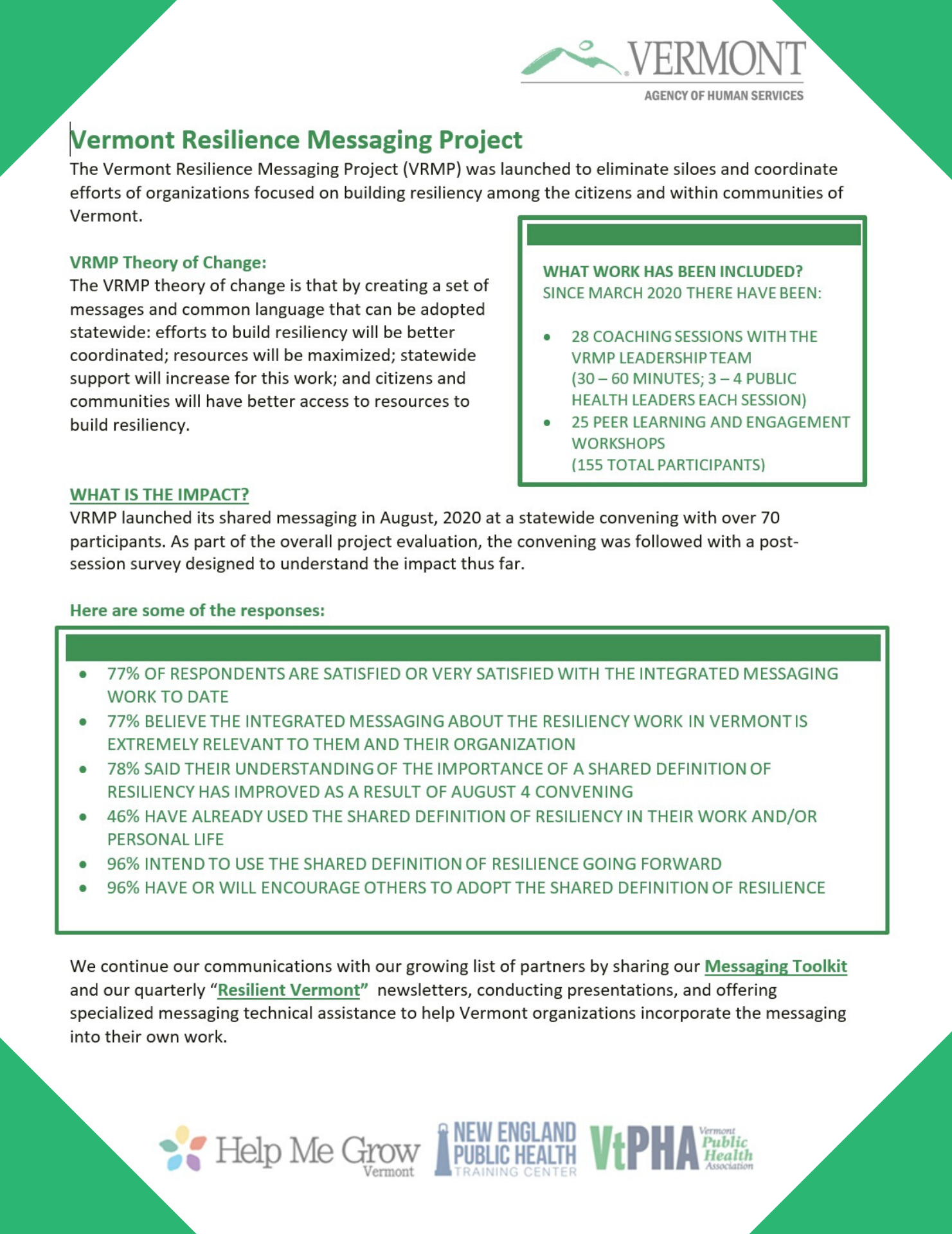Learning for Resilience Systems Change: Initial Evaluation Results
 NEPHTC believes that some learning, when well planned with our collaborative partners and their communities, can lead to systems change. The Our Impact Posts, have shown one of our flagship efforts at systems change through learning, describing what is now known as the Vermont Resilience Messaging Project, an effort to build a more resilient Vermont.
NEPHTC believes that some learning, when well planned with our collaborative partners and their communities, can lead to systems change. The Our Impact Posts, have shown one of our flagship efforts at systems change through learning, describing what is now known as the Vermont Resilience Messaging Project, an effort to build a more resilient Vermont.
Earlier in these posts, readers have been able to see the NEPHTC-supported Needs Assessment focusing on mental health and resilience in Vermont and what the workforce understood and needed.
Readers have also seen the crucial role of communications in bringing widespread organizations together around the issue of resilience. NEPHTC’s effort and communications expert created tools and newsletters to support the multi organizational and state wide resilience effort.
Today, we are delighted to post a One Pager about the project that is easy to share and includes some evaluation results of the project!
Evaluation Results
As of November 2020, there are twenty core organizations involved:
- 77% of respondents are satisfied or very satisfied with the integrated messaging work to date
- 77% believe the integrated messaging about the resiliency work in Vermont is extremely relevant to them and their organization
- 78% said their understanding of the importance of a shared definition of resiliency has improved as a result of August 4 convening
- 46% have already used the shared definition of resiliency in their work and/or personal life
- 96% intend to use the shared definition of resilience going forward
- 96% have or will encourage others to adopt the shared definition of resilience
These high level evaluation results show a high level of satisfaction with the messaging and communications work to date, which is reported in the context of the pandemic time period. More impressive was the number of survey respondents indicating future use of the resilience messaging.
While the evaluation report, as an interim report, is not available for download, NEPTHC is sharing the some remarks to give an indication of nature of feedback:
Evaluator: Over half identified ways in which the messaging would improve coordination across workers in the resiliency field and/or agencies doing resiliency work and the consistency of messaging from those workers and agencies.
Respondents:
“I think departments were kind of doing their own thing. I think a coordinated message will really help to ensure we are all working toward the same goal and sending the same message to the people of Vermont.”
“…Integrated messaging should improve our collaboration and ability to move the needed across all VT communities.”
“A collective definition and vision will support the internal and community-based work that is already happening in my district by aligning them toward a common purpose/set of values.”
Evaluator: Several others described how the messaging will increase awareness and improve understanding of resiliency. For some, the increased awareness and understanding is thought to drive responsibility for and accountability of organizations to the community. For one, it would reframe how his/her agency thinks about and approaches it work with families.
Respondents:
“Potentially more community understanding around the work that needs to be done for resiliency and what our shared goals are around it.”
“Increased shared understanding and responsibility across AHS and communities.”
“I hope to raise awareness of the importance of this work and make the language more common across offices and households across the state. I want everyone to know.”
“I hope that it will re-frame the child welfare response to families well beyond a ‘deficits’ framework into a strengths paradigm.”
The next steps of the Vermont Resilience Messaging Project are to continue to engage more partners by sharing the toolkit, doing more outreach, and looking for additional funding to increase the support of the effort to create a more resilient Vermont.
